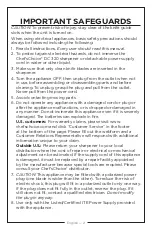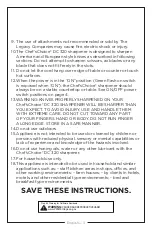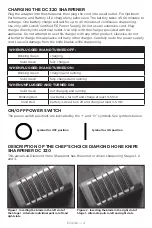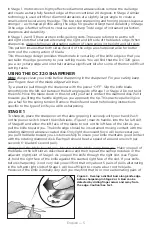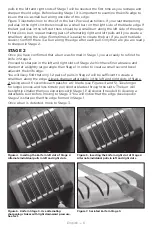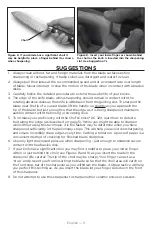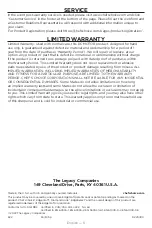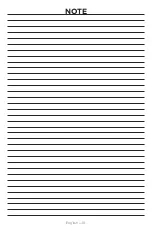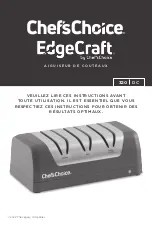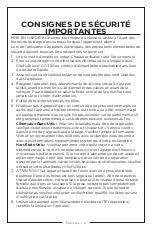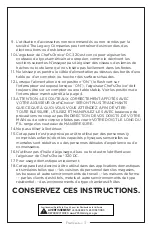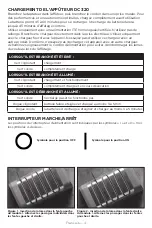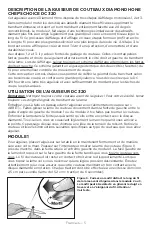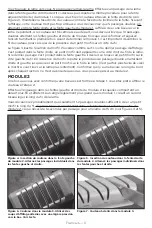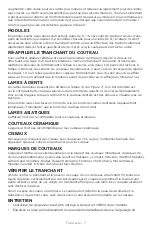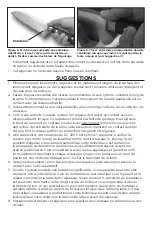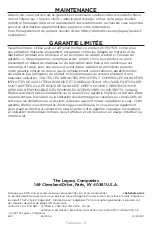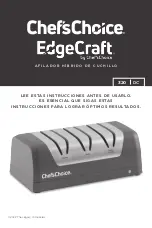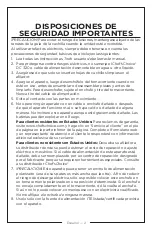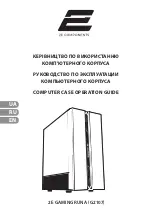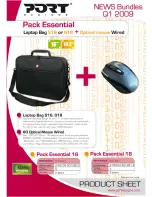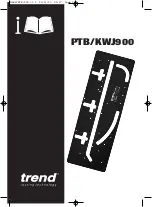
English — 7
STAGE 3
In general only two pairs of pulls (6” blade = 6 second pull) followed by one pair of faster
pulls (1-2 seconds each for 6” blade) in Stage 3 will be necessary to obtain a razor sharp
edge. Make alternating pulls rapidly in the left and right slots. After doing so, the knife is
ready to use.
RESHARPENING THE KNIFE EDGE
To resharpen, turn on the sharpener and follow the procedure for Stage 3 described
above, making one to two (1-2) alternating pulls. Then test the edge for sharpness. If
necessary resharpen again starting in Stage 2 followed by one to two (1-2) pairs of pulls in
Stage 3. In severe cases with a very dull knife you may find it necessary to repeat Stages 1,
2 or 3 as described above. Generally you should be able to resharpen several times using
only Stage 3 before having to resharpen in Stage 2 or 1.
SERRATED BLADES
Serrated blades can be sharpened in Stage 3 (see Figure 7). If the serrated edge is on the
left side of the knife, place in the left slot and vice versa. Generally, three to five pulls in
Stage 3 will be adequate. If the serrated knife is very dull, more pulls will be needed.
Because of their saw-like structures, the edges of serrated blades will never appear to be
as “sharp” as the edge on a straight edge knife.
ASIAN BLADES
The sharpener is not recommended for Asian knives.
CERAMIC KNIVES
The sharpener is not recommended for ceramic knives.
SCISSORS
Do not attempt to use the sharpener to sharpen scissors. The Legacy Companies does
manufacture special sharpeners designed just for scissors.
BRANDS OF KNIVES
The sharpener will put an excellent edge on most conventional metal Euro/American style
knives regardless of brands, including Henckels, Wüsthof, Sabatier, Lamson and Goodnow,
Global, Russell Harrington, Chef’sChoice, Messermeisser, Forshner, Mundial, Cuisinart,
Kitchen Aid, Shun and many, many more.
TEST FOR SHARPNESS
To test for sharpness and cutting ability of your fine edge knives, hold a sheet of paper
vertically by its upper edge and carefully cut down through the sheet a small (but safe)
distance from your fingers. A sharp edge (on a straight edge blade) will cut smoothly
without tearing the paper.
Alternatively try cutting a tomato. The knife should penetrate the skin of the tomato and
cut through it on the first pull without applying significant force to the knife.
MAINTENANCE
• The exterior of the sharpener can be cleaned with a damp soft cloth.
• Periodically shake out and dispose of the metal sharpening dust by inverting the
sharpener and lightly tapping it onto a newspaper, paper towel, or other paper sheet.
• No oils or other lubricating liquids are necessary with this sharpener.
Summary of Contents for EdgeCraft DC 320
Page 10: ...English 10 NOTE ...


